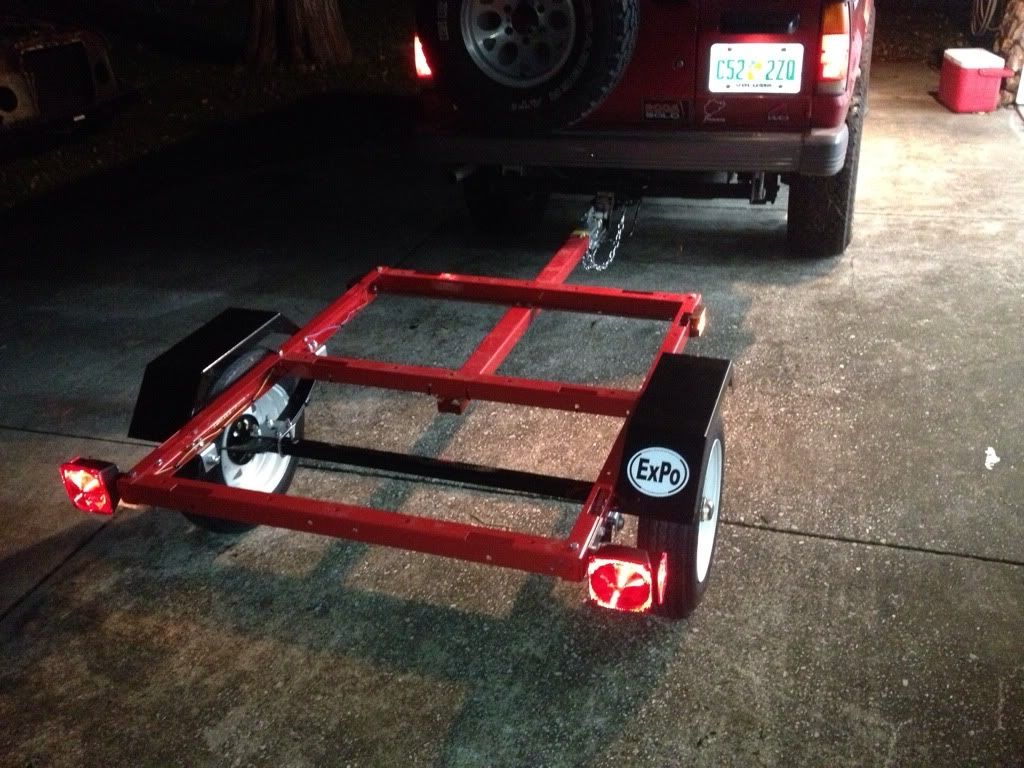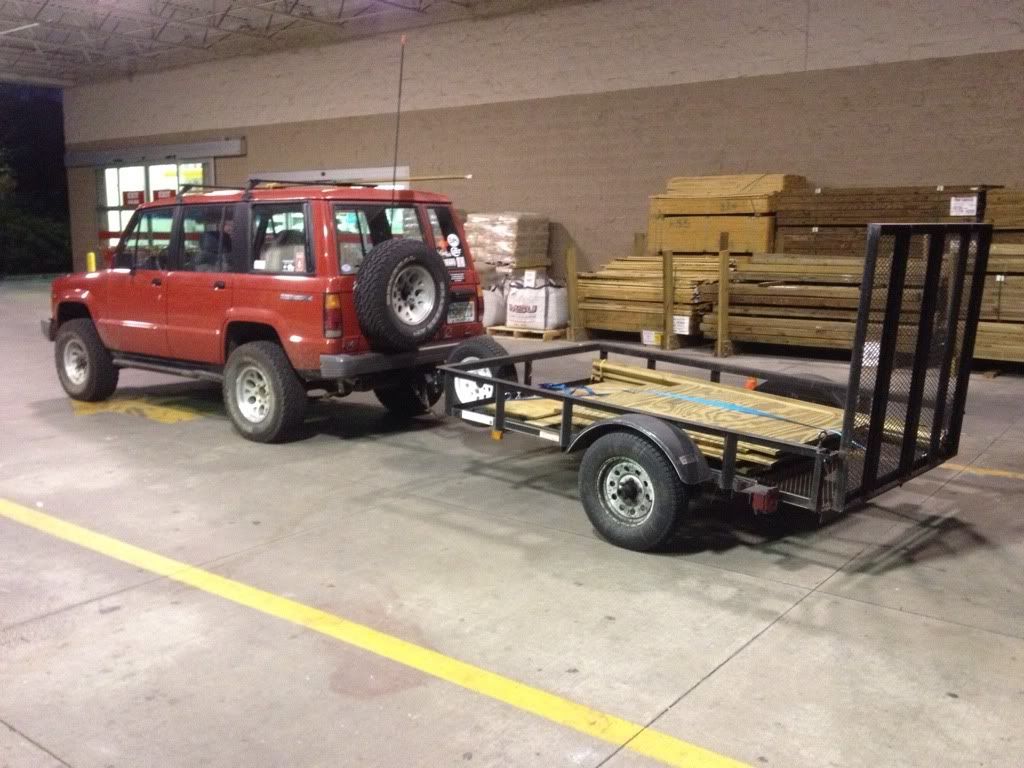Another tip is that my wife painted my entire trailer frame with Rustoleum. Supposedly, the red paint oxidizes to pink very quickly when exposed to UV light. Knowing you're in FL, that might be a consideration.
Another tip is that my wife painted my entire trailer frame with Rustoleum. Supposedly, the red paint oxidizes to pink very quickly when exposed to UV light. Knowing you're in FL, that might be a consideration.
In reply to the big tires: I'd like to. I have some extra Trooper wheels and tires. However, I'd have to get a new axle, which is currently outside my budget.
I was already planning on three trailer jacks. Great minds think alike. :)
I'm not too worried about oxidation, as I'll be covering up most of it with a box. It will also be stored indoors.
Still undecided as far as lift or drop. I think I'll get a drop hitch for now, then change axles in a few months after I've used it a few times.
The hubs from HF are crap. The bearings are a non-standard size that can only be sourced from HF. I swapped mine with a set from Tractor Supply ( also available at red trailer.com). Better tolerances, better bearings, better zirc fittings, and hubs available at any WalMart. If you go with larger tires, you will really want better hubs.
The frame will oxidize and peel pretty quickly. I also drilled holes and installed the wiring more securely than the oem clips.
pinchvalve wrote: If you go with larger tires, you will really want better hubs.
whoops, think you got that one backwards...
one of the best reasons to get bigger tires is that its a lot easier on your hubs and bearings. big tires spin slower. I would second changing out bearings, those cheap made in china ones will wear out and give you death wheel wobble within a year of regular use. Use a micometer to measure your bearing inner/outers and replace with tractor supply, since they use the most common ones. Always keep an extra in your trailer box, since they do sometimes go bad. Grease them regularly. Write down the bearing measurements so you can call around in a pinch.
If you are fortunate enough to have a matching bolt pattern on your trailer with whatever your tow vehicle is, then having the spares match is nice. There are only a few different trailer patterns, though, vs a million and a half for vehicles, so not much of a chance of that happening.
One thing you will find is that trailer tires are generally made in the cheapest fashion possible and tend to be junk. check the sidewalls and keep them inflated to preserve load carrying capacity, but at 110 psi even a 4x8 utility trailer will bounce off the ground unloaded over railroad tracks, which can be annoying. LT truck tires are an upgrade as far as quality of construction (and often load carrying capacity as well). If you can go up a load rating to gain a sidewall ply or two I would. Sidewalls tend to take a beating on trailer tires, rubbing against curbs in drivethroughs and etc.
blocks are fine on trailers, though I've found perches and spring pads on cheap trailer often lack center pins, and if thats the case I'd feel more comfortable welding a block to the perch. Center pins play a big role in keeping blocks in the right place. don't forget longer U bolts. Ebay is probably your best bet as far as that goes.... a seller on there is R&P carriages, I've ordered hundreds of bucks of stuff from them over the years, they sell good stuff, they know trailers in and out, they have excellent customer service, and their prices are usually about the lowest. I can't recommend them enough...
Led's are definitely the way to go for trailer lighting, they last forever, don't have sockets to corrode, and they are less of a draw on your tow vehicles electrical system. The good thing about wiring is that there are basically 3 wires. Make sure your grounds are good, never just screw a machine screw into the trailer... that will break off when its corroded and you are troubleshooting the wiring and then you'll be stuck. I like to scour and then weld a decent sized bolt to the trailer frame by the head, then use ring terminals.. won't ever break off and welding to frame gives electrical continuity.
Use a junction box at the front of the trailer, it will make troubleshooting twice as fast and easy. I've replaced the front section of trailer wiring (the plug and lead) maybe 6 times, and having a junction box makes it way easier than having to cut and splice.... also makes adding 12 volt accessories much easier. Doesn't have to be anything fancy, a barrier strip inside an electrical junction box works fine.
On any electrical connection, smear dielectric grease to seal and protect from corrosion. this goes a long way towards preventing problems down the road. tack small pieces of angle iron out and over any projecting lights... seems like any time I accidentaly bump a fence post or something, it always hits square on a light.
If you want to make the trailer easier to back up, extend the tongue out. Lets you turn sharper without jackknifing and adds some stability when traveling backwards.
To help with the visibility issue with a narrow trailer behind a wider truck, use cable clamps like you would to hold wire against a rafter to hold on 2 of the orange reflector sticks from lowes (not the ones with big round reflectors on top, the ones that are just like a plastic pole). that way you can see them stick up above the tailgate or hatch.
There is nothing wrong with a drop or raise hitch, unless you have a big gay mud truck and you need one of the 16" drop ones that just look sketchy (and hitch with more than 6" or so of drop really needs to be braced against something else at the bottom to keep any kind of load rating). A 2" drop/1" rise hitch will serve most uses for just about everything they need. I'd recommend getting a 6k capacity one (standard) in case you want to tow something bigger. Walmart is usually the cheapest, uhaul often just as close. One great thing about uhaul is if the nut ever gets rusted or stuck on, they service their equipment (hitches included) for life, so you can go to the nearest uhaul and let their "tech" get it loose for you. Walmart sells the reese towpower stuff which has notches to hold the ball in place while you are tightening it. Doesnt' sound like a big deal but its really nice. If you head to walmart pick up the big double ended wrench they sell (for another $12 or $15 or whatever) that fits the nut. Its a big nut and its good to have a wrench you can carry with you if you need to tighten it or flip the ball. I also recommend buying extra electrical connectors since that is usualy where the wiring will fail.
I didn't work on the trailer much today, but I did finish the wiring and piece together the right hitch setup from my dad's scrap bin. I ended up with a 4" drop hitch to get the trailer nearly level.
I don't have anything against drop hitches, I was just trying to keep things simple. I have a 1"? drop (the standard one everybody uses) hitch with a convert-a-ball on it that I use for our other 4 trailers, and I was hoping I wouldn't have to add another hitch to the mix. Oh well.

The plan is to buy materials tomorrow morning, assuming I can finish some real work tonight. I'm antsy to start playing with wood!
I sometimes think about converting my HF 4'x4' trailer to a single person mini teardrop camper - too small, I imagine.
Send more details on your camper.
I built mine own utility with a 2000lb axle, carlise tires, LED lights.. its almost 5x10. long tongue, all that business. I like it. I think I had like $600 in it all together.
Tom Suddard wrote: Oh, and if you hadn't noticed my trailer needs a lift kit, as drop hitches are for quitters. Any ideas? I'm thinking I need to just make some blocks.
Put in taller shackles where the spring connects to the frame.
Gusset them well.
Dan
Oh, I changed the width measurements to 39" in order to account for the 1/2" plywood. It's fairly close to 1/2" thick, right? The floor and roof will still be 40", and they'll sit on the bottom and top of the walls
I think you'll be disappointed with half inch plywood. It will be worth the extra cost and weight to upgrade to three quarter.
Woody's right - I used 3/4" pressure-treated plywood for mine, and defintely didn't regret it. It's handled some pretty serious use and abuse without any issues, I know that if I had gone with 1/2" I would be replacing sections of it already. In addition to being more durable, 3/4" plywood doesn't flex nearly as much as 1/2".
Edit: I'll take some pictures of mine and will post them up, as they may give you some ideas.
Woohoo! I just got all the materials. I ended up using a mixture of 1/2" and 3/4", depending on what part and the loads I'll be putting on it. Construction starts soon.

You are building one of these aren't you? ![]()
http://www.youtube.com/watch?v=4UCZF_UnG10&feature=related
Keep up the good work.
You'll need to log in to post.